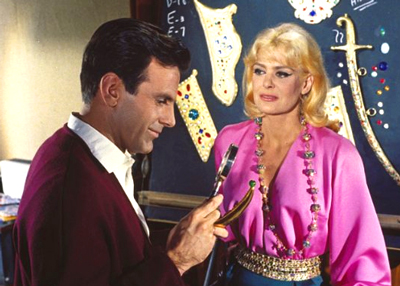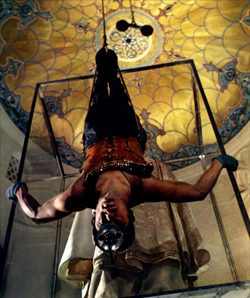
 |
|
|
|
One doesn't think of Hollywood blacklistees politically exiled to Europe, as living happy lives. Joseph Losey, John Berry and Cy Endfield struggled for years, and the tone of the movies they eventually made abroad is often quite bitter, with a pessimistic political edge. The great Jules Dassin had already built up an impressive reputation when he landed in France, but our state department and the American Legion worked from afar to keep foreign producers from hiring him. His luck turned when his superb crime tale Du Rififi chez les hommes became an international hit. At the Cannes Film Festival he met Greek actress Melina Mercouri, who became the love of his life, his muse and his collaborator both in France and Greece, in Never on Sunday, Phaedra and 10:30 P.M. Summer. He ended up with a unique film career. 
Rififi had been the ultimate expression of série noir misery and defeat, a heist story populated by luckless crooks facing the cops, merciless competitors and weakness from within their own ranks. Dassin himself played a downhearted informer, and his sympathetic performance now seems an act of generosity to those that aided and abetted the witch hunters. Nine years later Topkapi plays like the movie of a spiritually revitalized man -- after more dark movies about tribal crucifixions (He Who Must Die), crazy and cruel 'civic games' (The Law) and a doomed romance sprung from Greek myth (Phaedra), Dassin replays Rifii as an escapist romp, to compete with the dozens of international caper films he inspired. It must be the happiest film ever made by a blacklisted director. Topkapi is in bright Technicolor and set in the exotic city of Istanbul. Instead of a lowly squealer, this time Dassin chooses to play a tiny role as an honest cop. Dassin's beloved Greek Life-Force angel Mercouri plays a siren who loves any man that can get her the priceless jewels she covets. All's fair in this Love and Rubies fable -- we like our thieves even when they set up a 'schmo' to possibly receive a death sentence. 1
Decorated with kaleidoscopic titles by Jean Fouchet, and the teasingly bright music of Manos Hadjidakis, Topkapi presents a fistful of comic characters. Manic sensationalist-adventuress Elizabeth Lipp (Melina Mercouri) wants to steal a jeweled dagger from a display
Topkapi has fun, jokes, intrigue, suspense and a good helping of travelogue vistas, all soaked in the infectious Hadjidakis music. It even has the odd spectacle of a hundred or so oiled Turkish wrestlers in stadium combat, all at once. Its most famous image would be a toss-up between our playful thieves sneaking across the rooftop of the Topkapi Palace with the entire Bosporous in the background, or the sight of the acrobat Giulio suspended upside-down, using an odd set of tools to lift a heavy glass case from the coveted jeweled dagger. There were light-activated alarms in the original caper classic The Asphalt Jungle, but Dassin really inaugurated the technology- driven heist when his thieves deactivated an alarm in Rififi. From then on every caper needed a gimmick; even Goldfinger. This picture outfits the ancient Topkapi Museum with sensors in the floor, necessitating Giulio's aerial approach -- but should he drop anything the jig will be up. Stephen Soderbergh's
But it's the character interaction that most amuses. Even the Turkish cops are great guys, and their prisons are a shade more pleasant than depicted elsewhere. Melina Mercouri is bigger than life and probably a bit too much for some viewers; she wears a lot of makeup and plays every emotion and gesture broad and loud. At 44 she's pushing the outer margin to play an irresistible fox. Yet she's no diva-in-denial, like Joan Crawford. Elisabeth is on her game and all-woman. She enjoys herself mightily at all times. Everybody else seems to be in on the crime just to be around her. Mercouri radiates warmth and, well, "alive-ness". Dassin surely felt she was the best thing that ever happened to him.
Unitl Topkapi the late Maximillian Schell was mostly known in America for playing conscience-stricken Germans. Here he's a charming delight, whether holding a victim at gunpoint or blithely leading his crew into a wildly improbable crime, under the noses of the Turkish cops. Schell's Walter and Mercouri's Elizabeth seem drawn to the heist for its very beauty, as if Stealing Big were the kind of activity that makes life worthwhile.
The great Peter Ustinov picked up a second acting Oscar for Topkapi. His Arthur Simon Simpson is a stooge, but the way he comes around to trusting his fellow crooks is very endearing. It's as if he's just having too good of a time not to join in. Since Arthur is a last-minute replacement he makes the heist an even riskier proposition. He proves he can lift and pull a fairly heavy object, so Walter brings him along on the rooftop prowl, to be the anchor holding Giulio on the end of a rope. Just as all seems to be under control, he's yanked off his feet and almost clear off the roof, and the entire audience jumps in surprise. Dassin's wise choice was to let his comics be amusing, but to make the actual crime a fairly serious affair: no Jerry Lewis crossed eyes or wacky screams. 
Topkapi is a movie about happy people, made by happy people. Viewers aware of the appallingly grim endings of Brute Force and Night and the City can see that Jules Dassin has been to noir hell and returned to embrace joy once more. A caper film to charm the inner thief in every viewer, Topkapi finishes with a set of fantastic, gloriously carefree epilogue-end credits. 2 Jules Dassin's son Joe Dassin has a small role in the movie. By this time he had became a well-known pop musician in France. His 1965 song became a 2003 short subject of the same title: Bip-Bip.
The KL Studio Classics Blu-ray of Topkapi is a good but not grand HD encoding of a film originally released in Technicolor. Although the show is intact and has good color, the film element used has many scratches and instances of dirt. The transfer is fairly old (at least ten years)
On a scale of Excellent, Good, Fair, and Poor,
Topkapi Blu-ray rates:
Footnotes:
1. Melina Mercouri was a vociferous Greek patriot and later served as a Minister in the Greek Government. One of her pet causes was a crusade to get the fabled Elgin Marbles returned to Greece; they had been looted by a British Ambassador in the early 1800s, and placed on exhibit in the British Museum. In Phaedra Mercouri's character pays a visit to them in London. Dassin might have considered a caper film about stealing them, but the Greek art treasure was surely no laughing matter to Ms. Mercouri.
2. And also influential -- Topkapi's 'cast cakewalk' curtain call is made more elaborate for the finale of The Adventures of Buckaroo Banzai Across the 8th Dimension.

Reviews on the Savant main site have additional credits information and are often updated and annotated with reader input and graphics. T'was Ever Thus.
Review Staff | About DVD Talk | Newsletter Subscribe | Join DVD Talk Forum |
| ||||||||||||||||||